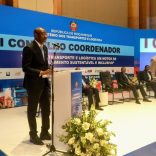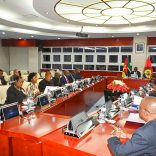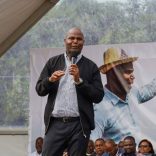Mozambique: Number of deaths, injuries on roads 'dramatic' - transport minister
Abstentions may ‘win’ Nampula by-election – Savana

Photo: Twitter @opaisonline
Delays, inadvertent exchange of electoral rolls and voters whose names were not on the lists are the dominant features of the by-election in Nampula, called after the heinous assassination of Mahamudo Amurane, the then Mozambique Democratic Movement (MDM) mayor elected 2013 and much loved in the city, Savana reports today.
Although several polling stations opened at the scheduled time, there are records of polling stations that opened at 9 o’clock on the outskirts, a situation attributed by the director of the Provincial Election Commission (CPE), Daniel Ramos, to the rain the previous night in the city of Nampula making it difficult to distribute voting material.
Such was the case of the EPC in Namutequeliua, which saw three of its six voting tables open an hour-and-a-half late for lack of material, which irritated several voters. “This is sabotage. They want to return the city to Frelimo, ” one shouted. In the opinion of some voters, the argument of rain does not convince because there are tables that did not open in the built-up zone and had problems of switched electoral rolls.
Meanwhile, in neighbourhoods like Muala Expansão and Namicopo (the most populous of Nampula and Renamo’s traditional electoral base), voters jostled early to be the first to vote and enjoy the rest of the day off. In Nampula, where many young people work as motorcycle taxi drivers, a special holiday was decreed, a mechanism seen as crucial to getting people to the polls. The turnout was however not overwhelming, and could be as low to 50 percent, well above the 26 percent of the 2013 elections, in which however Renamo, a party with an important electoral record in Nampula, did not participate.
At polling station number 030001701, set up on EPC October 12 in Muala Expansão, mediaFAX/Savana witnessed a relative affluence. It was at this table, which opened half an hour late, that Filomena Mutoropa voted at 10 o’clock. Mutoropa is known in Nampula as the “crying candidate”, for having burst into tears when she did not see her name on the ballot paper in the 2013 municipal elections, forcing the elections to be repeated. These were to be won by the MDM candidate Mahamudo Amurane, who was murdered on October 4, 2017, the day celebrating the 25th anniversary of the Rome agreements which ended a bloody war between the Frelimo government and Renamo, led by Afonso Dhlakama.
Intense surveillance
During preparations for the election, especially in the electoral campaign, the slogan was “vigilance”. The possibility of fraud was raised when the National Election Commission (CNE) committed what it later called a “technical failure” by sending documents in electronic format to the political parties with disorganised, incomplete information which moreover differed from the printed electoral rolls.
Hence, it was not by chance that several electoral observers arrived in Nampula. According to data from the CPE, 47 international observers and around 1,000 nationals were accredited. The Joint Observation Platform of Civil Society, called the Peace Hall, has recorded cases of electoral rolls that were not the same as those made available to political parties. Such was the case of EP1 de Impuecha, EPC of Malipussi-mesa03001207. The Platform states that 43 percent of the 401 polling stations set for these elections opened more than an hour late. The remainder opened the scheduled time.
In Namicopo, especially in Mulila, groups of young people, who do not want the city to return to Frelimo, remain vigilant and organised, but the electoral authorities call for calm and serenity. There is also a strong possibility of a second round between Frelimo candidate Amisse Cololo António and Renamo’s Paulo Vahanle.
There are 296,000 potential voters in the Nampula elections, which are being held at the basis of the 2014 electoral rolls. This means that those who turned 18 at the end of 2014 or later cannot vote which, according to Miguel de Brito, a researcher at the Electoral Institute for Sustainable Democracy in Africa (EISA), will prevent 35,000 voters from exercising their civic and constitutional right in this by-election. According to de Brito, the electoral census should by law have been updated for this by-election.
“As well as being illegal and unconstitutional, I think it is extremely unfair. I was astonished that none of the political parties protested against the decision not to update the voters’ register. I am curious to see if the Constitutional Council will decide on this matter when analysing the process for validation,” de Brito said in a recent interview with Savana.













Leave a Reply
Be the First to Comment!
You must be logged in to post a comment.
You must be logged in to post a comment.